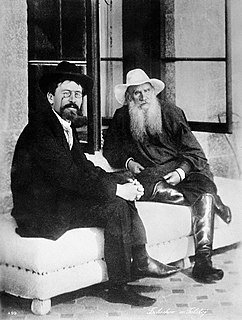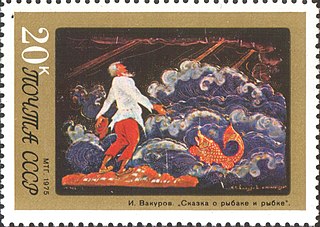
Alexander Sergeyevich Pushkin was a Russian poet, playwright, and novelist of the Romantic era. He is considered by many to be the greatest Russian poet, and the founder of modern Russian literature.

The Pushkin State Museum of Fine Arts is the largest museum of European art in Moscow, located in Volkhonka street, just opposite the Cathedral of Christ the Saviour. The International musical festival Sviatoslav Richter's December nights has been held in the Pushkin Museum since 1981.

The Russians are an East Slavic ethnic group native to Eastern Europe, who share a common Russian ancestry, culture, and history. Russian, the most spoken Slavic language, is the shared mother tongue of the Russians; and Orthodox Christianity is their historical religion since the 11th century. They are the largest Slavic nation, as well as the largest European nation.

Russian literature refers to the literature of Russia and its émigrés and to Russian-language literature. The roots of Russian literature can be traced to the Middle Ages, when epics and chronicles in Old East Slavic were composed. By the Age of Enlightenment, literature had grown in importance, and from the early 1830s, Russian literature underwent an astounding golden age in poetry, prose and drama. Romanticism permitted a flowering of poetic talent: Vasily Zhukovsky and later his protégé Alexander Pushkin came to the fore. Prose was flourishing as well. The first great Russian novelist was Nikolai Gogol. Then came Ivan Turgenev, who mastered both short stories and novels. Fyodor Dostoevsky and Leo Tolstoy soon became internationally renowned. In the second half of the century Anton Chekhov excelled in short stories and became a leading dramatist. The beginning of the 20th century ranks as the Silver Age of Russian poetry. The poets most often associated with the "Silver Age" are Konstantin Balmont, Valery Bryusov, Alexander Blok, Anna Akhmatova, Nikolay Gumilyov, Osip Mandelstam, Sergei Yesenin, Vladimir Mayakovsky, Marina Tsvetaeva and Boris Pasternak. This era produced some first-rate novelists and short-story writers, such as Aleksandr Kuprin, Nobel Prize winner Ivan Bunin, Leonid Andreyev, Fyodor Sologub, Aleksey Remizov, Yevgeny Zamyatin, Dmitry Merezhkovsky and Andrei Bely.

Eugene Onegin is a novel in verse written by Alexander Pushkin. Onegin is considered a classic of Russian literature, and its eponymous protagonist has served as the model for a number of Russian literary heroes. It was published in serial form between 1825 and 1832. The first complete edition was published in 1833, and the currently accepted version is based on the 1837 publication.

Aleksandr Konstantinovich Petrov is a Russian animator and animation director.

The Tale of the Fisherman and the Fish is a fairy tale in verse by Alexander Pushkin, published 1835.

Izabella Akhatovna Akhmadulina was a Soviet and Russian poet, short story writer, and translator, known for her apolitical writing stance. She was part of the Russian New Wave literary movement. She was cited by Joseph Brodsky as the best living poet in the Russian language. She is known in Russia as "the voice of the epoch".

Golden Age of Russian Poetry is the name traditionally applied by philologists to the first half of the 19th century. It is also called the Age of Pushkin, after its most significant poet. Mikhail Lermontov and Fyodor Tyutchev are generally regarded as two most important Romantic poets after Pushkin. Vasily Zhukovsky and Konstantin Batyushkov are the best-regarded of his precursors. Pushkin himself, however, considered Evgeny Baratynsky to be the finest poet of his day.
"The Tale of the Priest and of his Workman Balda" is a fairy tale in verse by Alexander Pushkin. Pushkin wrote the tale on September 13, 1830 while staying at Boldino. It is based on a Russian folk tale which Pushkin collected in Mikhaylovskoye early on. The Tale of the Priest and of his Workman Balda consists of 189 extremely varied lines that range from three to fourteen syllables but made to rhyme in couplets. In the summer of 1831, Pushkin read the tale to Nikolai Gogol who liked it a great deal. The Tale was first published posthumously by Vasily Zhukovsky in 1840 with considerable alterations due to censorship; the Priest character was replaced by a merchant.

"The Blizzard" is the second of five short stories that constitute The Tales of the Late Ivan Petrovich Belkin by Aleksandr Pushkin. The manuscript for the story was originally completed October 20, 1830. It was intended to be the last of The Tales of the Late Ivan Petrovich Belkin to be published, but Pushkin decided to push the story to the front of the volume. The novella, so comical and at the same time so dramatic, is considered to be one of the masterpieces of Russian literature.

Boris Godunov is a closet play by Alexander Pushkin. It was written in 1825, published in 1831, but not approved for performance by the censor until 1866. Its subject is the Russian ruler Boris Godunov, who reigned as Tsar from 1598 to 1605. It consists of 25 scenes and is written predominantly in blank verse.
Boris Leo Brasol, lawyer and literary critic, was a White Russian immigrant to the United States.
James E. Falen is a professor emeritus of Russian at the University of Tennessee. He published a translation of Eugene Onegin by Alexander Pushkin in 1990 which was also influenced by Nabokov's translation, but preserved the Onegin stanzas (ISBN 0809316307). This translation is considered to be the most faithful one to Pushkin's spirit according to Russian critics and translators.

A Russian fairy tale or folktale is a fairy tale from Russia.
Afro-Russians or Black Russians are people of African descent that have migrated to and settled in Russia. The Metis Foundation estimates that there were about 50,000 Afro-Russians in 2009.

Commemorative Cantata for the Centenary of the Birth of Pushkin, Op. 65, is a cantata by Alexander Glazunov, composed in 1899 in memory of author Alexander Pushkin. It is also known as Memorial Cantata and Cantata in Memory of Pushkin's 100th Birthday. The work in five movements on lyrics by Konstantin Romanov is scored for solo voices, choir and piano.
To the Slanderers of Russia is a patriotic poem by Alexander Pushkin, published in 1831.

Pushkin Is Our Everything is a 2014 American documentary film directed, written, and produced by Michael Beckelhimer. The film is about life and times of the 19th-century Russian poet Aleksandr Pushkin and his lasting influence and legacy on 200 years of Russian history. The name of the film is a set expression in Russian.

Aleksandr Pavlovich Bubnov (1908–1964) was a noted Soviet painter, best known for the portraits of Stalin and for a monumental canvas, "Morning on the Kulikovo Field". He got the Stalin Prize in 1948 and became the corresponding member of the Soviet Academy of Arts in 1954.













